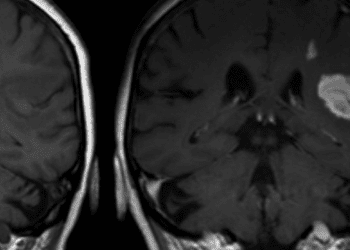Therapeutic anticoagulation increases bleeding risk without improvements in clinical outcomes in patients admitted for COVID-19 and elevated D-dimer
1. Therapeutic anticoagulation with rivaroxaban or enoxaparin did not improve clinical outcomes and increased bleeding compared with prophylactic anticoagulation.
2. Net clinical benefit composite of death, thrombotic events, and major or clinically relevant non-major bleeding was not significantly different between groups.
Evidence Rating Level: 1 (Excellent)
Study Rundown: COVID-19 is associated with thrombotic complications leading to adverse clinical outcomes. Whether or not therapeutic anticoagulation improves outcomes in patients hospitalized with COVID-19 is unknown. This randomized controlled trial aimed to assess the safety and efficacy of therapeutic versus prophylactic anticoagulation for preventing complications in patients hospitalized with COVID-19 and elevated D-dimer concentration. The primary efficacy outcome was a composite of time to death, duration of hospitalization, and duration of supplemental oxygen use through 30 days, while the primary safety outcome was major or clinically relevant non-major bleeding. Secondary outcomes included duration of supplemental oxygen or mechanical ventilation support, disease progression (mild, moderate, or severe), and rehospitalization. According to the study, in-hospital therapeutic anticoagulation with rivaroxaban or enoxaparin followed by rivaroxaban to day 30 did not improve clinical outcomes and increased bleeding compared with prophylactic anticoagulation. A major limitation of this study was the self-reporting of adverse events by patients after discharge from the hospital. Nevertheless, it provided valuable insight into the use of therapeutic anticoagulation for patients hospitalized with COVID-19.
Click to read the study in The Lancet
Relevant Reading: Aspirin or Rivaroxaban for VTE Prophylaxis after Hip or Knee Arthroplasty
In-depth [randomized controlled trial]: Between Jun 24, 2020, and Feb 26, 2021, 3331 patients were assessed for eligibility at 31 sites in Brazil. Included patients were ≥18 years of age, had an elevated D-dimer concentration, were hospitalized with COVID-19, and had COVID-19 symptoms for up to 14 days prior to randomization. Those with contraindications to rivaroxaban or heparin, and high risk for bleeding, were excluded. Altogether, 615 patients (311 in the therapeutic anticoagulation group and 304 in the prophylactic anticoagulation group) were included in analysis. At baseline, the mean patient age was 56.6 years (standard deviation [SD] 14.3) and majority (60%) were men.
The primary efficacy outcome of composite of time to death, duration of hospitalization, and duration of supplemental O2 was not statistically different between anticoagulation groups. The therapeutic group reported 28 899 (34.8%) wins compared to 34 288 (41.3%) wins in the prophylactic group (win ratio 0.86, 95% confidence interval [CI] 0.59-1.22, p=0.40). The primary safety outcome of major or clinically relevant non-major bleeding occurred in 26 (8%) patients assigned to therapeutic anticoagulation and 7 (2%) patients assigned to prophylactic anticoagulation (relative risk [RR] 3.64, 95% CI 1.61-8.27, p=0.0010). Results for the primary outcome were consistent across subgroups. At 30 days, the incidence of individual thrombotic events was not significantly different between groups, nor was the composite of venous thromboembolism, myocardial infarction, stroke, systemic embolism, or major adverse limb events (RR 0.75, 95% CI 0.45-1.26, p=0.32). Overall, findings from this study suggest that the use of therapeutic-dose rivaroxaban could not be recommended for hospitalized COVID-19 patients with an elevated D-dimer concentration.
Image: PD
©2021 2 Minute Medicine, Inc. All rights reserved. No works may be reproduced without expressed written consent from 2 Minute Medicine, Inc. Inquire about licensing here. No article should be construed as medical advice and is not intended as such by the authors or by 2 Minute Medicine, Inc.








